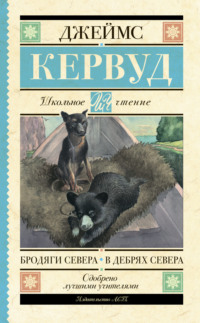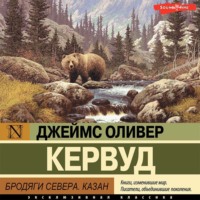 полная версия
полная версияThe Valley of Silent Men
"It is hard to say good-by to all that, Father," he said. "But, if you don't mind, I'd rather not talk about it. I'm not afraid of it. And why be unhappy because one has only a little while to live? Looking back over your life, does it seem so very long ago that you were a boy, a small boy?"
"The time has gone swiftly, very swiftly."
"It seems only yesterday – or so?"
"Yes, only yesterday – or so."
Kent's face lit up with the whimsical smile that long ago had reached the little missioner's heart. "Well, that's the way I'm looking at it, Father. There is only a yesterday, a today, and a tomorrow in the longest of our lives. Looking back from seventy years isn't much different from looking back from thirty-six when you're looking back and not ahead. Do you think what I have just said will free Sandy McTrigger?"
"There is no doubt. Your statements have been accepted as a death-bed confession."
The little missioner, instead of Kent, was betraying a bit of nervousness.
"There are matters, my son – some few matters – which you will want attended to. Shall we not talk about them?"
"You mean – "
"Your people, first. I remember that once you told me there was no one. But surely there is some one somewhere."
Kent shook his head. "There is no one now. For ten years those forests out there have been father, mother, and home to me."
"But there must be personal affairs, affairs which you would like to entrust, perhaps, to me?"
Kent's face brightened, and for an instant a flash of humor leaped into his eyes. "It is funny," he chuckled. "Since you remind me of it, Father, it is quite in form to make my will. I've bought a few little pieces of land here. Now that the railroad has almost reached us from Edmonton, they've jumped up from the seven or eight hundred dollars I gave for them to about ten thousand. I want you to sell the lots and use the money in your work. Put as much of it on the Indians as you can. They've always been good brothers to me. And I wouldn't waste much time in getting my signature on some sort of paper to that effect."
Father Layonne's eyes shone softly. "God will bless you for that, Jimmy," he said, using the intimate name by which he had known him. "And I think He is going to pardon you for something else, if you have the courage to ask Him."
"I am pardoned," replied Kent, looking out through the window. "I feel it. I know it, Father."
In his soul the little missioner was praying. He knew that Kent's religion was not his religion, and he did not press the service which he would otherwise have rendered. After a moment he rose to his feet, and it was the old Kent who looked up into his face, the clean-faced, gray-eyed, unafraid Kent, smiling in the old way.
"I have one big favor to ask of you, Father," he said. "If I've got a day to live, I don't want every one forcing the fact on me that I'm dying. If I've any friends left, I want them to come in and see me, and talk, and crack jokes. I want to smoke my pipe. I'll appreciate a box of cigars if you'll send 'em up. Cardigan can't object now. Will you arrange these things for me? They'll listen to you – and please shove my cot a little nearer the window before you go."
Father Layonne performed the service in silence. Then at last the yearning overcame him to have the soul speak out, that his God might be more merciful, and he said: "My boy, you are sorry? You repent that you killed John Barkley?"
"No, I'm not sorry. It had to be done. And please don't forget the cigars, will you, Father?"
"No, I won't forget," said the little missioner, and turned away.
As the door opened and closed behind him, the flash of humor leaped into Kent's eyes again, and he chuckled even as he wiped another of the telltale stains of blood from his lips. He had played the game. And the funny part about it was that no one in all the world would ever know, except himself – and perhaps one other.
CHAPTER II
Outside Kent's window was Spring, the glorious Spring of the Northland, and in spite of the death-grip that was tightening in his chest he drank it in deeply and leaned over so that his eyes traveled over wide spaces of the world that had been his only a short time before.
It occurred to him that he had suggested this knoll that overlooked both settlement and river as the site for the building which Dr. Cardigan called his hospital. It was a structure rough and unadorned, unpainted, and sweetly smelling with the aroma of the spruce trees from the heart of which its unplaned lumber was cut. The breath of it was a thing to bring cheer and hope. Its silvery walls, in places golden and brown with pitch and freckled with knots, spoke joyously of life that would not die, and the woodpeckers came and hammered on it as though it were still a part of the forest, and red squirrels chattered on the roof and scampered about in play with a soft patter of feet.
"It's a pretty poor specimen of man that would die up here with all that under his eyes," Kent had said a year before, when he and Cardigan had picked out the site. "If he died looking at that, why, he just simply ought to die, Cardigan," he had laughed.
And now he was that poor specimen, looking out on the glory of the world!
His vision took in the South and a part of the East and West, and in all those directions there was no end of the forest. It was like a vast, many-colored sea with uneven billows rising and falling until the blue sky came down to meet them many miles away. More than once his heart ached at the thought of the two thin ribs of steel creeping up foot by foot and mile by mile from Edmonton, a hundred and fifty miles away. It was, to him, a desecration, a crime against Nature, the murder of his beloved wilderness. For in his soul that wilderness had grown to be more than a thing of spruce and cedar and balsam, of poplar and birch; more than a great, unused world of river and lake and swamp. It was an individual, a thing. His love for it was greater than his love for man. It was his inarticulate God. It held him as no religion in the world could have held him, and deeper and deeper it had drawn him into the soul of itself, delivering up to him one by one its guarded secrets and its mysteries, opening for him page by page the book that was the greatest of all books. And it was the wonder of it now, the fact that it was near him, about him, embracing him, glowing for him in the sunshine, whispering to him in the soft breath of the air, nodding and talking to him from the crest of every ridge, that gave to him a strange happiness even in these hours when he knew that he was dying.
And then his eyes fell nearer to the settlement which nestled along the edge of the shining river a quarter of a mile away. That, too, had been the wilderness, in the days before the railroad came. The poison of speculation was stirring, but it had not yet destroyed. Athabasca Landing was still the door that opened and closed on the great North. Its buildings were scattered and few, and built of logs and rough lumber. Even now he could hear the drowsy hum of the distant sawmill that was lazily turning out its grist. Not far away the wind-worn flag of the British Empire was floating over a Hudson Bay Company's post that had bartered in the trades of the North for more than a hundred years. Through that hundred years Athabasca Landing had pulsed with the heart-beats of strong men bred to the wilderness. Through it, working its way by river and dog sledge from the South, had gone the precious freight for which the farther North gave in exchange its still more precious furs. And today, as Kent looked down upon it, he saw that same activity as it had existed through the years of a century. A brigade of scows, laden to their gunwales, was just sweeping out into the river and into its current. Kent had watched the loading of them; now he saw them drifting lazily out from the shore, their long sweeps glinting in the sun, their crews singing wildly and fiercely their beloved Chanson des Voyageurs as their faces turned to the adventure of the North.
In Kent's throat rose a thing which he tried to choke back, but which broke from his lips in a low cry, almost a sob. He heard the distant singing, wild and free as the forests themselves, and he wanted to lean out of his window and shout a last good-by. For the brigade – a Company brigade, the brigade that had chanted its songs up and down the water reaches of the land for more than two hundred and fifty years – was starting north. And he knew where it was going – north, and still farther north; a hundred miles, five hundred, a thousand – and then another thousand before the last of the scows unburdened itself of its precious freight. For the lean and brown-visaged men who went with them there would be many months of clean living and joyous thrill under the open skies. Overwhelmed by the yearning that swept over him, Kent leaned back against his pillows and covered his eyes.
In those moments his brain painted for him swiftly and vividly the things he was losing. Tomorrow or next day he would be dead, and the river brigade would still be sweeping on – on into the Grand Rapids of the Athabasca, fighting the Death Chute, hazarding valiantly the rocks and rapids of the Grand Cascade, the whirlpools of the Devil's Mouth, the thundering roar and boiling dragon teeth of the Black Run – on to the end of the Athabasca, to the Slave, and into the Mackenzie, until the last rock-blunted nose of the outfit drank the tide-water of the Arctic Ocean. And he, James Kent, would be DEAD!
He uncovered his eyes, and there was a wan smile on his lips as he looked forth once more. There were sixteen scows in the brigade, and the biggest, he knew, was captained by Pierre Rossand. He could fancy Pierre's big red throat swelling in mighty song, for Pierre's wife was waiting for him a thousand miles away. The scows were caught steadily now in the grip of the river, and it seemed to Kent, as he watched them go, that they were the last fugitives fleeing from the encroaching monsters of steel. Unconscious of the act, he reached out his arms, and his soul cried out its farewell, even though his lips were silent.
He was glad when they were gone and when the voices of the chanting oarsmen were lost in the distance. Again he listened to the lazy hum of the sawmill, and over his head he heard the velvety run of a red squirrel and then its reckless chattering. The forests came back to him. Across his cot fell a patch of golden sunlight. A stronger breath of air came laden with the perfume of balsam and cedar through his window, and when the door opened and Cardigan entered, he found the old Kent facing him.
There was no change in Cardigan's voice or manner as he greeted him. But there was a tenseness in his face which he could not conceal. He had brought in Kent's pipe and tobacco. These he laid on a table until he had placed his head close to Kent's hearty listening to what he called the bruit– the rushing of blood through the aneurismal sac.
"Seems to me that I can hear it myself now and then," said Kent. "Worse, isn't it?"
Cardigan nodded. "Smoking may hurry it up a bit," he said. "Still, if you want to – "
Kent held out his hand for the pipe and tobacco. "It's worth it. Thanks, old man."
Kent loaded the pipe, and Cardigan lighted a match. For the first time in two weeks a cloud of smoke issued from between Kent's lips.
"The brigade is starting north," he said.
"Mostly Mackenzie River freight," replied Cardigan. "A long run."
"The finest in all the North. Three years ago O'Connor and I made it with the Follette outfit. Remember Follette – and Ladouceur? They both loved the same girl, and being good friends they decided to settle the matter by a swim through the Death Chute. The man who came through first was to have her. Gawd, Cardigan, what funny things happen! Follette came out first, but he was dead. He'd brained himself on a rock. And to this day Ladouceur hasn't married the girl, because he says Follette beat him; and that Follette's something-or-other would haunt him if he didn't play fair. It's a queer – "
He stopped and listened. In the hall was the approaching tread of unmistakable feet.
"O'Connor," he said.
Cardigan went to the door and opened it as O'Connor was about to knock. When the door closed again, the staff-sergeant was in the room alone with Kent. In one of his big hands he clutched a box of cigars, and in the other he held a bunch of vividly red fire-flowers.
"Father Layonne shoved these into my hands as I was coming up," he explained, dropping them on the table. "And I – well – I'm breaking regulations to come up an' tell you something, Jimmy. I never called you a liar in my life, but I'm calling you one now!"
He was gripping Kent's hands in the fierce clasp of a friendship that nothing could kill. Kent winced, but the pain of it was joy. He had feared that O'Connor, like Kedsty, must of necessity turn against him. Then he noticed something unusual in O'Connor's face and eyes. The staff-sergeant was not easily excited, yet he was visibly disturbed now.
"I don't know what the others saw, when you were making that confession, Kent. Mebby my eyesight was better because I spent a year and a half with you on the trail. You were lying. What's your game, old man?"
Kent groaned. "Have I got to go all over it again?" he appealed.
O'Connor began thumping back and forth over the floor. Kent had seen him that way sometimes in camp when there were perplexing problems ahead of them.
"You didn't kill John Barkley," he insisted. "I don't believe you did, and Inspector Kedsty doesn't believe it – yet the mighty queer part of it is – "
"What?"
"That Kedsty is acting on your confession in a big hurry. I don't believe it's according to Hoyle, as the regulations are written. But he's doing it. And I want to know – it's the biggest thing I EVER wanted to know – did you kill Barkley?"
"O'Connor, if you don't believe a dying man's word – you haven't much respect for death, have you?"
"That's the theory on which the law works, but sometimes it ain't human. Confound it, man, did you?"
"Yes."
O'Connor sat down and with his finger-nails pried open the box of cigars. "Mind if I smoke with you?" he asked. "I need it. I'm shot up with unexpected things this morning. Do you care if I ask you about the girl?"
"The girl!" exclaimed Kent. He sat up straighter, staring at O'Connor.
The staff-sergeant's eyes were on him with questioning steadiness. "I see – you don't know her," he said, lighting his cigar. "Neither do I. Never saw her before. That's why I am wondering about Inspector Kedsty. I tell you, it's queer. He didn't believe you this morning, yet he was all shot up. He wanted me to go with him to his house. The cords stood out on his neck like that – like my little finger.
"Then suddenly he changed his mind and said we'd go to the office. That took us along the road that runs through the poplar grove. It happened there. I'm not much of a girl's man, Kent, and I'd be a fool to try to tell you what she looked like. But there she was, standing in the path not ten feet ahead of us, and she stopped me in my tracks as quick as though she'd sent a shot into me. And she stopped Kedsty, too. I heard him give a sort of grunt – a funny sound, as though some one had hit him. I don't believe I could tell whether she had a dress on or not, for I never saw anything like her face, and her eyes, and her hair, and I stared at them like a thunder-struck fool. She didn't seem to notice me any more than if I'd been thin air, a ghost she couldn't see.
"She looked straight at Kedsty, and she kept looking at him – and then she passed us. Never said a word, mind you. She came so near I could have touched her with my hand, and not until she was that close did she take her eyes from Kedsty and look at me. And when she'd passed I thought what a couple of cursed idiots we were, standing there paralyzed, as if we'd never seen a beautiful girl before in our lives. I went to remark that much to the Old Man when – "
O'Connor bit his cigar half in two as he leaned nearer to the cot.
"Kent, I swear that Kedsty was as white as chalk when I looked at him! There wasn't a drop of blood left in his face, and he was staring straight ahead, as though the girl still stood there, and he gave another of those grunts – it wasn't a laugh – as if something was choking him. And then he said:
"'Sergeant, I've forgotten something important. I must go back to see Dr. Cardigan. You have my authority to give McTrigger his liberty at once!'"
O'Connor paused, as if expecting some expression of disbelief from Kent. When none came, he demanded,
"Was that according to the Criminal Code? Was it, Kent?"
"Not exactly. But, coming from the S.O.D., it was law."
"And I obeyed it," grunted the staff-sergeant. "And if you could have seen McTrigger! When I told him he was free, and unlocked his cell, he came out of it gropingly, like a blind man. And he would go no farther than the Inspector's office. He said he would wait there for him."
"And Kedsty?"
O'Connor jumped from his chair and began thumping back and forth across the room again. "Followed the girl," he exploded. "He couldn't have done anything else. He lied to me about Cardigan. There wouldn't be anything mysterious about it if he wasn't sixty and she less than twenty. She was pretty enough! But it wasn't her beauty that made him turn white there in the path. Not on your life it wasn't! I tell you he aged ten years in as many seconds. There was something in that girl's eyes more terrifying to him than a leveled gun, and after he'd looked into them, his first thought was of McTrigger, the man you're saving from the hangman. It's queer, Kent. The whole business is queer. And the queerest of it all is your confession."
"Yes, it's all very funny," agreed Kent. "That's what I've been telling myself right along, old man. You see, a little thing like a bullet changed it all. For if the bullet hadn't got me, I assure you I wouldn't have given Kedsty that confession, and an innocent man would have been hanged. As it is, Kedsty is shocked, demoralized. I'm the first man to soil the honor of the finest Service on the face of the earth, and I'm in Kedsty's division. Quite natural that he should be upset. And as for the girl – "
He shrugged his shoulders and tried to laugh. "Perhaps she came in this morning with one of the up-river scows and was merely taking a little constitutional," he suggested. "Didn't you ever notice, O'Connor, that in a certain light under poplar trees one's face is sometimes ghastly?"
"Yes, I've noticed it, when the trees are in full leaf, but not when they're just opening, Jimmy. It was the girl. Her eyes shattered every nerve in him. And his first words were an order for me to free McTrigger, coupled with the lie that he was coming back to see Cardigan. And if you could have seen her eyes when she turned them on me! They were blue – blue as violets – but shooting fire. I could imagine black eyes like that, but not blue ones. Kedsty simply wilted in their blaze. And there was a reason – I know it – a reason that sent his mind like lightning to the man in the cell!"
"Now, that you leave me out of it, the thing begins to get interesting," said Kent. "It's a matter of the relationship of this blonde girl and – "
"She isn't blonde – and I'm not leaving you out of it," interrupted O'Connor. "I never saw anything so black in my life as her hair. It was magnificent. If you saw that girl once, you would never forget her again as long as you lived. She has never been in Athabasca Landing before, or anywhere near here. If she had, we surely would have heard about her. She came for a purpose, and I believe that purpose was accomplished when Kedsty gave me the order to free McTrigger."
"That's possible, and probable," agreed Kent. "I always said you were the best clue-analyst in the force, Bucky. But I don't see where I come in."
O'Connor smiled grimly. "You don't? Well, I may be both blind and a fool, and perhaps a little excited. But it seemed to me that from the moment Inspector Kedsty laid his eyes on that girl he was a little too anxious to let McTrigger go and hang you in his place. A little too anxious, Kent."
The irony of the thing brought a hard smile to Kent's lips as he nodded for the cigars. "I'll try one of these on top of the pipe," he said, nipping off the end of the cigar with his teeth. "And you forget that I'm not going to hang, Bucky. Cardigan has given me until tomorrow night. Perhaps until the next day. Did you see Rossand's fleet leaving for up north? It made me think of three years ago!"
O'Connor was gripping his hand again. The coldness of it sent a chill into the staff-sergeant's heart. He rose and looked through the upper part of the window, so that the twitching in his throat was hidden from Kent. Then he went to the door.
"I'll see you again tomorrow," he said. "And if I find out anything more about the girl, I'll report."
He tried to laugh, but there was a tremble in his voice, a break in the humor he attempted to force.
Kent listened to the tramp of his heavy feet as they went down the hall.
CHAPTER III
Again the world came back to Kent, the world that lay just beyond his open window. But scarcely had O'Connor gone when it began to change, and in spite of his determination to keep hold of his nerve Kent felt creeping up with that change a thing that was oppressive and smothering. Swiftly the distant billowings of the forests were changing their tones and colors under the darkening approach of storm. The laughter of the hills and ridges went out. The shimmer of spruce and cedar and balsam turned to a somber black. The flashing gold and silver of birch and poplar dissolved into a ghostly and unanimated gray that was almost invisible. A deepening and somber gloom spread itself like a veil over the river that only a short time before had reflected the glory of the sun in the faces of dark-visaged men of the Company brigade. And with the gloom came steadily nearer a low rumbling of thunder.
For the first time since the mental excitement of his confession Kent felt upon him an appalling loneliness. He still was not afraid of death, but a part of his philosophy was gone. It was, after all, a difficult thing to die alone. He felt that the pressure in his chest was perceptible greater than it had been an hour or two before, and the thought grew upon him that it would be a terrible thing for the "explosion" to come when the sun was not shining. He wanted O'Connor back again. He had the desire to call out for Cardigan. He would have welcomed Father Layonne with a glad cry. Yet more than all else would he have had at his side in these moments of distress a woman. For the storm, as it massed heavier and nearer, filling the earth with its desolation, bridged vast spaces for him, and he found himself suddenly face to face with the might-have-beens of yesterday.
He saw, as he had never guessed before, the immeasurable gulf between helplessness and the wild, brute freedom of man, and his soul cried out – not for adventure, not for the savage strength of life – but for the presence of a creature frailer than himself, yet in the gentle touch of whose hand lay the might of all humanity.
He struggled with himself. He remembered that Dr. Cardigan had told him there would be moments of deep depression, and he tried to fight himself out of the grip of this that was on him. There was a bell at hand, but he refused to use it, for he sensed his own cowardice. His cigar had gone out, and he relighted it. He made an effort to bring his mind back to O'Connor, and the mystery girl, and Kedsty. He tried to visualize McTrigger, the man he had saved from the hangman, waiting for Kedsty in the office at barracks. He pictured the girl, as O'Connor had described her, with her black hair and blue eyes – and then the storm broke.
The rain came down in a deluge, and scarcely had it struck when the door opened and Cardigan hurried in to close the window. He remained for half an hour, and after that young Mercer, one of his two assistants, came in at intervals. Late in the afternoon it began to clear up, and Father Layonne returned with papers properly made out for Kent's signature. He was with Kent until sundown, when Mercer came in with supper.
Between that hour and ten o'clock Kent observed a vigilance on the part of Dr. Cardigan which struck him as being unusual. Four times he listened with the stethoscope at his chest, but when Kent asked the question which was in his mind, Cardigan shook his head.











